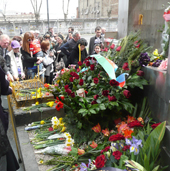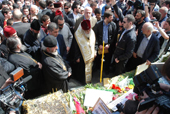April 9 marked by both government and opposition
By Salome Modebadze
Tuesday, April 10


Speaker of Parliament Davit Bakradze spoke of April 9 as a symbol of great sacrifice that reminds Georgians about the high cost of freedom, and the protection it needs.
In a statement on the importance of April 9 for the country’s further development, Georgian Dream commemorated the tragic date, calling it a symbol of the Georgian people’s struggle for freedom and selflessness.
“After 23 years since the tragedy, our country is still facing a serous choice. Our people have to struggle for freedom… at the ballot boxes to give our country the right perspective for development,” the statement read.
According to Bidzina Ivanishvili, leader of the coalition, April 9, 1989 was a day of massive struggle against the Soviet system. “Unfortunately, we still have to fight for fairness against a system that can be only called Saakashvili’s system,” he said, stressing that this existing system cannot be the result of the struggle that affected people 23 years ago.
Irakli Alasania, the leader of Our Georgia-Free Democrats, hopes that the Georgian people will demonstrate the same spirit they did 23 years ago. Worried that people lack sympathy, Alasania encouraged everyone to stand together and build an independent state.
Irakli Tsereteli from the National-Democratic Party was a member of the Independence Committee with Zviad Gamsakhurdia, Merab Kostava, Irakli Bathiashvili, Giorgi Chanturia and others, which organized the demonstration, demanding the restoration of Georgian independence.
As he said, if the members of the movement would have been aware of the tragic consequences of the April 9 protest, everything would have happened differently. “The Soviet Union, just like our current government, had all the resources to prevent any mass events without bloodshed,” he said on Monday. “But the April 9 massacre aimed at punishing the Georgian people for their aspiration to freedom,” Tsereteli maintained.
Nino Burjanadze, leader of Democratic Movement-United Georgia, said the events of that date in 1989 are tragic, but also a great day for Georgia. In her view, the entire country stood together despite their different viewpoints, so that even a huge empire could not defeat a small country.
As Deputy Minister of Foreign Affairs Nino Kalandadze said at the Ministry's regular Monday briefing, April 9 has become a symbol of the restoration of Georgian statehood, but added that Georgia still has to struggle for independence.
In addition to the memorial on Rustaveli, the Catholicos-Patriarch of All Georgia, the Archbishop of Mtskheta-Tbilisi, and the Metropolitan of Bichvinta and Tskhum-Abkhazia Ilia II held a civil funeral rite with choristers yesterday.
